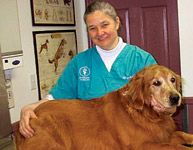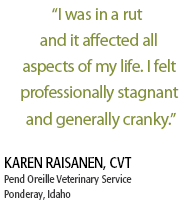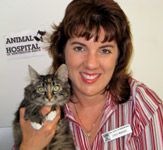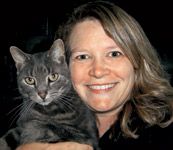Tired of your job?
You used to love your job, but now it just feels worn out. Don't give up. You can make it new again. Learn how thanks to four team members' true burnout survival stories.
Fatigue. Frustration. Apathy. It's normal to have these feelings once in a while. But if you're experiencing them every day, you may be burned out. To recover and get rejuvenated, you'll need to change your environment, your responsibilities, or even your employer.

That's what the team members on the following pages did. Their true stories of burnout survival reveal that by identifying the problem, you too can love your work again.
I lost my balance
For me, burnout was like a depression, an overpowering emotion that made me wonder whether I'd feel this way for the rest of my career. Every morning I'd wake up and dread going to work. It was such an effort to get ready. I felt mentally exhausted, and the burnout overshadowed other parts of my life.

MARY JEAN CALVI, LVT Pawling Animal Clinic Pawling, N.Y.
I couldn't enjoy the time I had away from work. I'd be happily involved in some outside activity then remember that tomorrow I had to go back to work. Then my fun would be over.
I wondered what had happened, what had changed. My position in this profession that I always loved was suddenly just a job. Every day for years, I looked forward to work. Every patient, diagnosis, and injury offered an opportunity to learn, use my skills, and become a better technician. I couldn't understand why I had lost that excitement.
I'd read articles and online posts about burnout, but I couldn't believe it might be happening to me. Then these feelings tainted everything. I couldn't sleep. I'd wake up every morning at 3—not on purpose—and e-mail my sister or friend about what I was going through. It was cathartic to put my angst in a message and send it away. Afterwards, I could go back to sleep. But the lost sleep took its toll on me.
Back then, I rarely took a sick day or a vacation day. I was the only technician at my practice, and I knew everyone counted on me. I always prided myself on being conscientious and responsible, but I finally reached the point where I needed time away to relax and evaluate my situation. So I took a vacation.
The first few days I just relaxed. Then I analyzed what was happening in my professional life. I dissected every part of my work week. By examining each day and each aspect of my job, I pinpointed the root of my burnout. I realized that being an effective technician also meant being a normal person with interests outside the workplace. When I returned to work, I was ready to make a change. Soon I started enjoying the job I always loved. And I still do.
Focusing on other aspects of my life renewed my passion for my job. I love my work as a veterinary technician, but I also enjoy being a musician at church and working as an emergency medical technician. I learned that to feel balanced, I need to spend time in all of these roles.
The most important thing I learned is that I must address the signs of burnout before they overwhelm me. Now, if I'm sick, I call in sick. If I feel a situation is spinning out of control, I deal with the problem or take time away to regroup. Because if I'm not feeling up to par, I can't be an effective technician for my patients or my practice.
I wasn't challenged
As a licensed technician for 25 years, I've addressed burnout twice. After 18 years in various small animal practices, I felt burnout creeping up on me for several months. I was in a rut, and it affected all aspects of my life. I felt professionally stagnant and generally cranky at home and at work. I decided a vacation would probably help. So I spent two weeks with my husband and our four dogs on family property in the mountains more than 400 miles away.

Usually, when our vacations are about over, I'm looking forward to returning home. But this vacation was different. When it came time to go home, I burst into tears. I didn't want to leave the comfort I had found relaxing in the alpine forest. I spent most of the trip home considering all the negative feelings I had about my job.
A fast-paced lifestyle and a hectic practice had certainly laid the foundation for burnout. I worked long hours, often through lunch breaks. And the emotional drain of dealing with clients during difficult times added to my burden. I was ready for a change.
So when we arrived home from our vacation, I updated my resume and sent it to the three veterinary practices near our family property. Three weeks later, I returned to two of the clinics for interviews. The practice that impressed me most offered me a job on the spot. Fortunately, my husband was willing to relocate and start over with a new computer consulting business. So I accepted a position with the mixed animal practice and we moved to the mountainous rural area.
At my new practice, I worked hands-on with multiple large animal species and learned so much every day. I thrived at the practice. The geographical and lifestyle changes, coupled with the large animal work, renewed my love for my job. And although I earned less, it was well worth it. Once again I looked forward to work each day.
A few years later, this busy mixed practice phased out large animal work. I was disappointed. After a couple years of small animal work, I sunk into another rut. My job just didn't excite me the way it used to, and soon those familiar burnout feelings crept in. I didn't like the person I was becoming, and I needed a change.
I didn't want to move again. I was specifically looking to use my head more and my body less but stay in the veterinary field to use my 30-plus years of experience. Then a position opened up in our clinic. It would allow me to perform technician duties part time and assume purchasing and human resources responsibilities to maintain full-time status. I jumped at the chance. As a technician over 50 years old, some desk work was certainly appealing. And voilà, my new role stimulated me and reduced my physical stress. The mix of administrative and technician work is perfect for me and my boss.
I did too much
I suffered from a classic case of burning the candle at both ends. Almost everything was my responsibility. I hired, fired, purchased, sent reminders, managed payroll, and trained employees. If it had to be done in my two-doctor small animal practice, I did it.

LESLIE BOUDREAU, RVT Animal Hospital of Huntington Beach Huntington Beach, Calif.
My husband can attest that I spent time at home griping about my job. He classified me as exhausted. Luckily, my burnout didn't affect our relationship much because he worked odd hours and we didn't have kids at the time.
My employees would say I was short-tempered and inaccessible. I had little time left for encouraging them. I was a firefighter dousing fire after fire. I chose my management techniques by trial and error.
At the end of a miserable 14-hour day during an already 50-hour week, I decided I needed a break. The next day, I called in sick for the first time in memory. I received eight phone calls the first hour. "How do I do this? Where is that? Are you sure you can't come in?" "No, no, no," I said. "I need a day off." The next day, back at my desk, a cold realization hit me: The sign of a good manager is how well the business functions when she's gone. I was obviously a failure. I vowed to redeem myself. To do so, I needed to expand my vocabulary to include an unfamiliar word: delegate.
So I promoted and trained a head receptionist and a technician supervisor. I delegated responsibilities, keeping those only I could do. This lightened my load and made my employees feel empowered and valued.
After three months, my team members realized they didn't need to come to me with every question. They had supervisors to turn to, and they often felt they had the tools to find the answers themselves.
I finally watched from my office as the technician supervisor counted the inventory and called in our weekly drug order. The receptionists managed the reminders during a slow hour. A sign announcing our next training seminar conducted by a pharmaceutical representative hung over the time clock.
I happily anticipated my upcoming vacation—the first in four years. I knew my practice could survive without me. Before I left, I told my team, "Delegate before your candle becomes a flare, leaving you burned out on the road to practice management. Oh, and don't forget, payroll's due on the 15th."
I was on the wrong team
I started my first job during my sophomore year of high school as a kennel attendant at a local animal hospital. I loved it, and I worked there for the next three years until I left for college. After graduating with bachelor's degrees in biology and psychology, I returned to the veterinary field and started my first real job as a veterinary assistant. Eight years later, I was standing at the anesthesia table early in the morning mixing a cocktail for a Labrador retriever, and I was shaking because I wanted to be anywhere else but there. I hated my job.

KRISTINE SUSZCZYNSKI Portland Veterinary Specialists Portland, Maine
I was responsible for general patient care, assisting with surgeries, taking and filing radiographs, scheduling maintenance on the processor, running lab work, ordering drugs, and maintaining inventory, and I was burned out. There was one veterinary assistant to help me restrain pets and prepare for surgery and two kennel attendants to run our large boarding facility and help restrain pets when they could. I was constantly pulled in countless directions.
I fought through the all-consuming desire to leave. I remained at that practice for another year, but it didn't get any better. Then two things happened that changed my life: I got pregnant and my boss died.
My pregnancy was planned, and, of course, my boss's death wasn't. His wife put the practice up for sale, and it sold quickly. So then I had a new boss. I was working more than 10 hours every day and that tough schedule took a toll on my pregnant body.
My original plan was to take maternity leave, then send my child to day care and return to the same job, with the same five-day work week and same long hours. But staff turnover, internal strife, and the changes that came with a new owner began to erode my loyalty and my interest in the work. Then I had my baby.
At home with my newborn, even through the colic and sleepless nights, everything became clear: I didn't want to leave my chosen field. I just needed to find a position where I could work fewer hours in a practice that focused on developing a strong, well-trained team.
I found that place in a 3-year-old practice five miles from my home. Because the practice was new, it needed good management and the doctors and team members were open to every idea. Within minutes of my conversation with the two owners, I knew this practice was the right fit.
Yes, I took a 25 percent pay cut. But I had a short commute, worked four days instead of five, and enjoyed flexible hours. The employees were wonderful, and the owners allowed me to hire more talented team members.
I delegated tasks to people who wanted them, and I made sure no one ever had too much on their plate. The technicians rotated through their shifts, so they did something different every day, whether it was caring for patients, assisting in surgeries, working with clients during exams, performing lab work, or helping at the reception desk.
The owners always put team members first, and our our opinions always counted. Plus we all had fun together. We went to the movies, dinner, and even a Broadway musical together.
We created a profitable practice, and I worked with a great group of people. I loved my job again. It wasn't perfect—we still experienced some normal bumps and hurdles along the way—but I was always happy. I worked at the practice for nine years before I moved out of state. Three years later, I still work at a veterinary hospital, and I still love it. Change is good. Finding good people to work for and work with is even better.
Please send your questions or comments to firstline@advanstar.com.